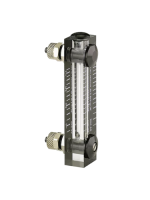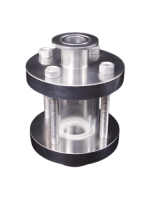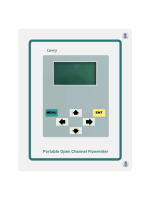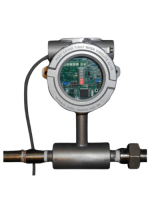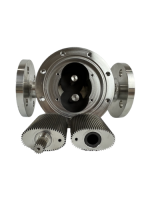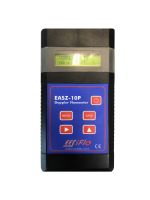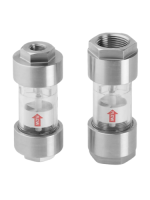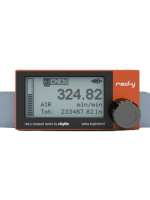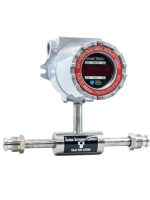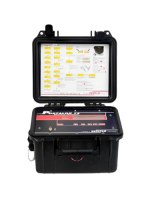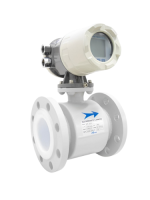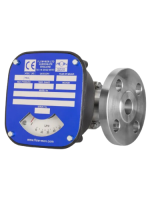
What is Coriolis flow meter and how does it operate?
Coriolis Mass Flow Meter utilizes two parallel arranged pipes rotated at their resonant frequency by coils. Any mass flow passing through the tubes generates Coriolis forces, which occur whenever mass moves radially in a rotating system. These forces have opposing effects on the inlet and outlet sides, causing slight deformations in the pipes. Sensors on both the inlet and outlet sides detect the excursion of the pipes. The phase shift between the rotational frequencies of both pipes is proportional to the mass flow rate.
Additionally, the resonant frequency of both pipes changes in accordance with the density of the medium, allowing for density determination. With one sensor, density and temperature can also be measured. The extent of pipe deformation depends on temperature, so temperature measurement is crucial for compensation purposes.


F1001-SERIES- Coriolis Mass Flow Meter





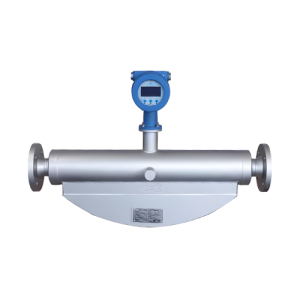

Features
- Direct measurement: Mass flow, density, temperature, volume (by mass flow and density), Water-cut oil, Brix. For options
- API table compensation for density and volume
- No moving parts & abrasion, low maintenance, Compatible to fluid and environment change
- Unparalleled high reliability & accuracy up to 0.1%
- UL/CSA approved for Class I, Div.1
- II 2G Exdbib IIB/IIC T*Gb (ATEX Pending)
- NIST traceable calibration
The F1001-Series Coriolis mass flowmeter offers unparalleled performance in mass flow, density, and temperature measurement. It goes beyond by providing real-time calculations of volume flow, total flow, and fluid composition. Presently, it boasts three distinct styles: M type sensor, U type sensor, and S type sensor, each complemented by its own compact and remote meters.
Typically, a standard mass flowmeter comprises a flow sensor and a signal transmitter. The flow sensor features two vibration-equipped flow tubes that generate signals for pickoff. Simultaneously, the signal transmitter incorporates a digital signal processor (DSP) and a dynamic vibration balance (DVB) circuit, ensuring both rapid response and precise measurement accuracy. Moreover, the F1001-Series offers versatility with its compact and remote meter options for each sensor style.
Facilitating seamless in situ operations, the mass flowmeter supports node-configuration, diagnostics, and data recording effortlessly through HART or Modbus RTU communication. This ensures that users can efficiently manage and monitor the device, enhancing overall operational control and reliability. Upgrade your fluid measurement capabilities with the advanced features and versatility of the F1001-Series Coriolis mass flowmeter.
Specifications
- Size: 1/8” to 12”
- Flow range: 3-1,500,000kg/hr.
- process pressure: Up to 250bar (based on size)
- process temp.: Up to 300℃
- Transmitter: DSP digital
- Process connection: ANSI, ASME, DIN, JIS, Customized
- Communication: 4-20mA; Pulse/Frequency; Modbus RTU (RS485) HART protocol
- Exdib II CT4-T6
- Class I Div. 1 Groups B, C, and D (UL/CSA Listed)
- II 2G Exdbib IIB/IIC T*Gb (ATEX Pending)

Applications








What sets the Coriolis flow meter apart is its ability to provide direct, real-time measurements of mass flow rate, density, and temperature—all in one compact device. This versatility makes it indispensable across a diverse array of industries, from petroleum refining to pharmaceutical manufacturing, where precision and reliability are paramount.
In essence, the Coriolis flow meter isn’t just a tool for measuring fluid flow; it’s a testament to the ingenuity of human innovation, tapping into the subtle forces of nature to deliver unparalleled accuracy and insight into the dynamics of fluid motion.
Related products:
